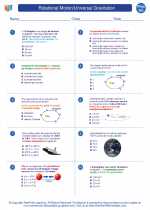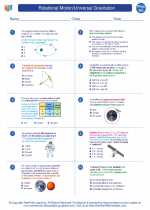Kinetic Energy
Kinetic energy is the energy an object possesses due to its motion. The kinetic energy of an object depends on its mass and velocity. The formula for kinetic energy is:
KE = 0.5 * m * v2
Where:
- KE = kinetic energy (in joules)
- m = mass of the object (in kilograms)
- v = velocity of the object (in meters per second)
Key Concepts
- Relationship with Mass: The kinetic energy of an object increases with its mass. A heavier object moving at the same velocity as a lighter object will have more kinetic energy.
- Relationship with Velocity: The kinetic energy of an object increases with the square of its velocity. This means that doubling the velocity will quadruple the kinetic energy.
- Units: The SI unit of kinetic energy is the joule (J).
Calculating Kinetic Energy
To calculate the kinetic energy of an object, you can use the formula KE = 0.5 * m * v2. Ensure that the mass is in kilograms and the velocity is in meters per second for accurate results.
Examples
Let's work through a couple of examples to illustrate the concept of kinetic energy:
Example 1: A car with a mass of 1000 kg is traveling at a velocity of 20 m/s. Calculate its kinetic energy.
Solution:
KE = 0.5 * 1000 kg * (20 m/s)2
KE = 0.5 * 1000 * 400
KE = 0.5 * 400,000
KE = 200,000 J
Example 2: A bullet with a mass of 0.01 kg has a velocity of 500 m/s. Calculate its kinetic energy.
Solution:
KE = 0.5 * 0.01 kg * (500 m/s)2
KE = 0.5 * 0.01 * 250,000
KE = 0.5 * 2500
KE = 1250 J
Study Guide
When studying kinetic energy, make sure to focus on the following key points:
- Understand the formula for kinetic energy and how it relates to mass and velocity.
- Practice solving problems involving the calculation of kinetic energy for various objects.
- Explore real-world examples of kinetic energy and its applications, such as in sports, transportation, and machinery.
- Compare and contrast the kinetic energy of different objects based on their mass and velocity.
Remember that kinetic energy is an essential concept in physics and has numerous practical implications in everyday life. Mastering this topic will not only help you excel in your physics studies but also deepen your understanding of the physical world around you.
Good luck with your studies!
.◂Physics Worksheets and Study Guides High School. Rotational Motion/Universal Gravitation

 Worksheet/Answer key
Worksheet/Answer key
 Worksheet/Answer key
Worksheet/Answer key
